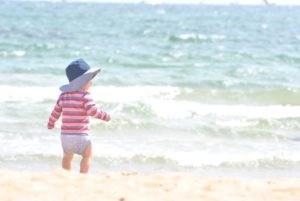Specialists warn about the necessary precautions regarding sun exposure, especially for children and babies, as sunscreen for babies is not allowed for those under six months old.
The recommendation from pediatricians is to protect the baby from the sun and use light, cotton clothing that doesn’t retain much external heat. Ideally, you should avoid exposing the child to sunlight before they turn six months old, since a baby’s skin is still very thin and sensitive. The best times to give your baby a sun bath are before ten o’clock in the morning and after four o’clock in the afternoon, when ultraviolet rays are at their lowest intensity.
How to Choose the Ideal Sunscreen for Your Baby?
When the baby turns six months old, their skin already has characteristics very similar to adult skin. The risk of intoxication from using sunscreen for babies is much lower because their skin can expel harmful chemicals.
The best option is to choose an appropriate sunscreen for babies that does not contain allergenic components. However, it is always good to check the label of each product to see if it is marked as hypoallergenic, meaning it has a reduced risk of causing allergies.
Physical sunscreen is the most recommended for children aged six months to two years. These products come in cream form, provide protection against radiation, and are safer since they are not absorbed by the skin.
Only after the age of two can children use sunscreens with chemical filters, which are usually indicated by the acronym SPF. It is recommended to use SPF 15 for indirect sun exposure and SPF 30 to 50 for more intense exposure.
Ideal Sun Exposure Time to Prevent Sunburn
Extreme care must be taken with a baby’s skin, so sun bathing should be limited to ten to twenty minutes per day, which is sufficient. The ideal is to expose only your child’s legs and arms, keeping the face protected.
It’s recommended not to leave the baby in just a diaper without clothes; the correct way is to keep them protected, as their skin is very thin and sensitive and can burn easily. They should not be directly exposed to the sun.
Sunscreen should be applied thirty minutes before exposing the child to the sun, and it should be applied thoroughly to protect the entire body, including the face, trunk, limbs, ears, neck, and the backs of the hands and feet.
For the lips, use a stick sunscreen. It’s important to pay attention to reapplying the product every hour or whenever the child spends a long time in the water.
Sunburn in Babies – What to Do?
If a sunburn occurs, the right thing to do is seek help from your pediatrician; depending on how serious it is, only they will know the best treatment. Burned skin from sun exposure becomes very red and hot, and in more severe cases, blisters, swelling, and fever may appear. In serious cases, hospitalization may be required.
Give your baby plenty of fluids, and if they are still breastfeeding, offer as much breast milk as possible. This helps prevent dehydration caused by long sun exposure. To help cool the skin, it is advisable to apply a washcloth soaked in cool water (squeeze out the excess) gently to the affected area.
A warm water bath also helps refresh the skin, but avoid cold water or ice, as the cold may further damage the baby’s skin. Do not use products containing oil on your baby’s skin, as these can make the problem worse and trap heat and sweat.
The best cream for sunburn is water-based or Aloe vera, specially formulated for babies, and ideal when the skin starts peeling. Be careful with creams and lotions that contain camphor or very strong fragrances.
Skin usually begins to peel between three and ten days after the burn. Don’t be alarmed; this is part of the healing and recovery process. During this time, it’s essential not to expose the child to the sun again.
There are many creams that help regenerate the skin, such as Bepantol, aloe vera cream, or natural options like cool natural calendula tea, which can be applied with compresses to soothe and refresh the skin. But never medicate your child on your own—see your pediatrician to ensure the proper treatment. This way, you avoid hindering your child’s recovery and skin healing.
A baby’s skin is very sensitive and deserves extra care, as it can burn even on cloudy days, due to muggy weather and UV radiation. On these days, sunscreen should still be used, just as you would during sun exposure. Children should also be dressed in light clothing and offered plenty of fluids to avoid dehydration.
See Also: Sun Bath for Babies – Why Is It Important?
Photo: parassseth












